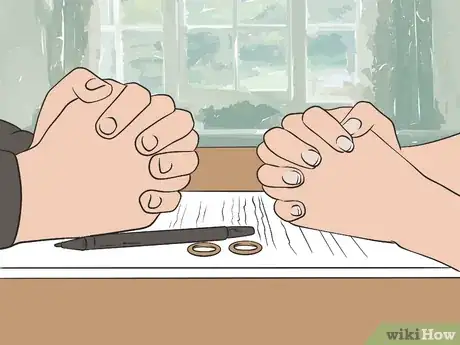This article was co-authored by Omar Ruiz, LMFT and by wikiHow staff writer, Hannah Madden. Omar Ruiz is a Licensed Marriage & Family Therapist and the Owner of TalkThinkThrive, PLLC. With over 11 years of counseling experience, he specializes in helping couples resolve issues and restore intimacy. He has been featured in numerous publications, including The New York Times, Women’s Health, and WebMD. Omar holds a BS in Psychology from Howard University and an MS in Family Therapy from The University of Massachusetts Boston.
There are 7 references cited in this article, which can be found at the bottom of the page.
This article has been viewed 25,190 times.
When your marriage is going through a rough patch, you might decide that a separation is your next best move. But having one person move out of the home isn’t always possible—whether it’s for financial reasons, parenting reasons, or social reasons. Whatever the case may be, we’ve got the 11 best tips you can use to separate from your spouse while still living together amicably.
Things You Should Know
- Sleep in separate beds, and discuss your boundaries with each other. Talk about how to handle social situations.
- Divide up household chores, finances, and parenting responsibilities.
- Talk to your children about this new dynamic so they aren’t confused. Decide on whether you’ll have family time together or separately.
Steps
Expert Q&A
-
QuestionHow do I deal with the pain of separation?
 Omar Ruiz, LMFTOmar Ruiz is a Licensed Marriage & Family Therapist and the Owner of TalkThinkThrive, PLLC. With over 11 years of counseling experience, he specializes in helping couples resolve issues and restore intimacy. He has been featured in numerous publications, including The New York Times, Women’s Health, and WebMD. Omar holds a BS in Psychology from Howard University and an MS in Family Therapy from The University of Massachusetts Boston.
Omar Ruiz, LMFTOmar Ruiz is a Licensed Marriage & Family Therapist and the Owner of TalkThinkThrive, PLLC. With over 11 years of counseling experience, he specializes in helping couples resolve issues and restore intimacy. He has been featured in numerous publications, including The New York Times, Women’s Health, and WebMD. Omar holds a BS in Psychology from Howard University and an MS in Family Therapy from The University of Massachusetts Boston.
Licensed Marriage & Family Therapist Divorce is like one of the most traumatic situations a person can go through because it’s a complete shift in your life and it has a lot of implications on one’s identity within a particular society. For that, it's extremely important to first connect with friends and family that you trust. You can also look for a therapist that specializes in couples therapy as well as divorce, since these professionals also provide individual counseling as well.
Divorce is like one of the most traumatic situations a person can go through because it’s a complete shift in your life and it has a lot of implications on one’s identity within a particular society. For that, it's extremely important to first connect with friends and family that you trust. You can also look for a therapist that specializes in couples therapy as well as divorce, since these professionals also provide individual counseling as well.
References
- ↑ https://www.australianfamilylawyers.com.au/information-centre/separated-but-living-under-one-roof
- ↑ https://www.australianfamilylawyers.com.au/information-centre/separated-but-living-under-one-roof
- ↑ https://lisagelman.com/north-york-lawyer/surviving-separation-while-living-in-the-same-house/
- ↑ https://lisagelman.com/north-york-lawyer/surviving-separation-while-living-in-the-same-house/
- ↑ https://www.citizensadvice.org.uk/scotland/family/relationship-problems-s/ending-a-relationship-when-you-re-living-together-s/
- ↑ https://www.fatherly.com/love-money/stay-together-for-kids-separated
- ↑ https://www.citizensadvice.org.uk/scotland/family/relationship-problems-s/ending-a-relationship-when-you-re-living-together-s/
- ↑ https://amicable.io/living-together-during-separation-or-divorce
- ↑ https://www.fairwaydivorce.com/blog/tips-on-how-to-live-together-while-separated






































































